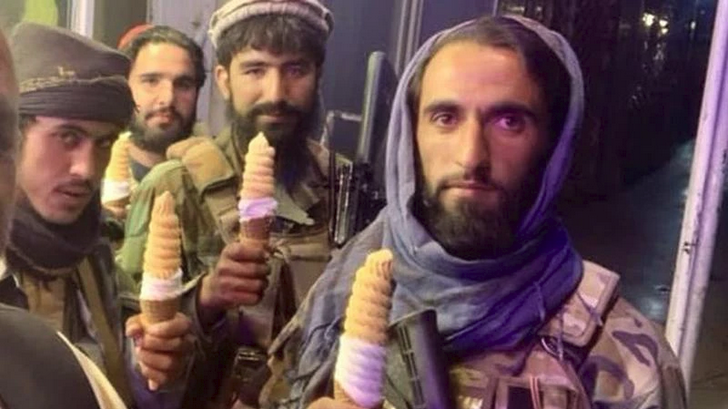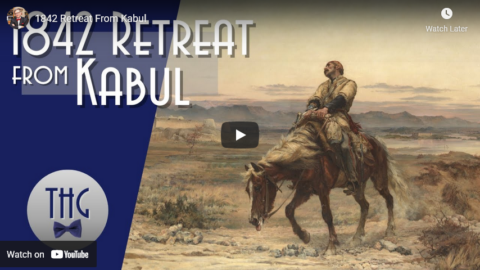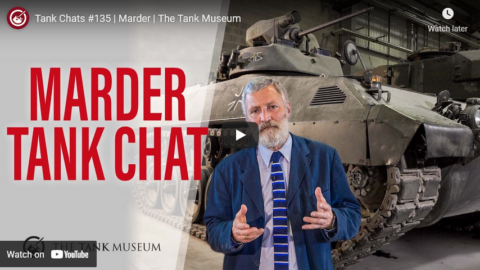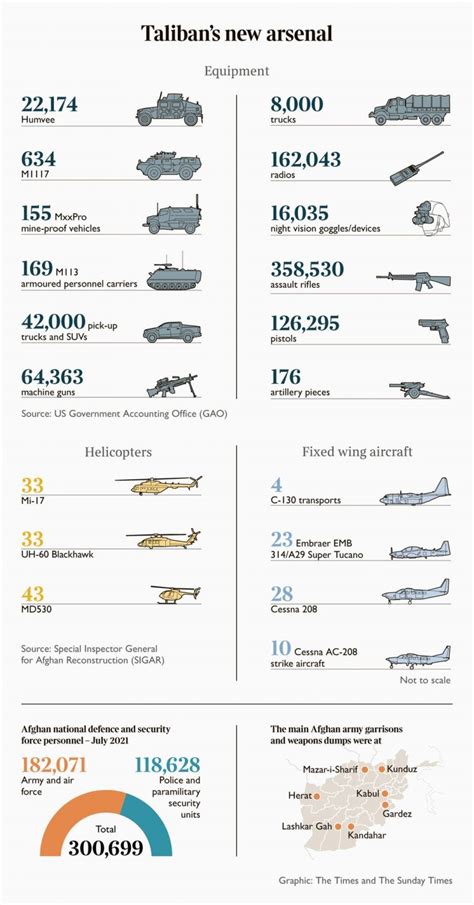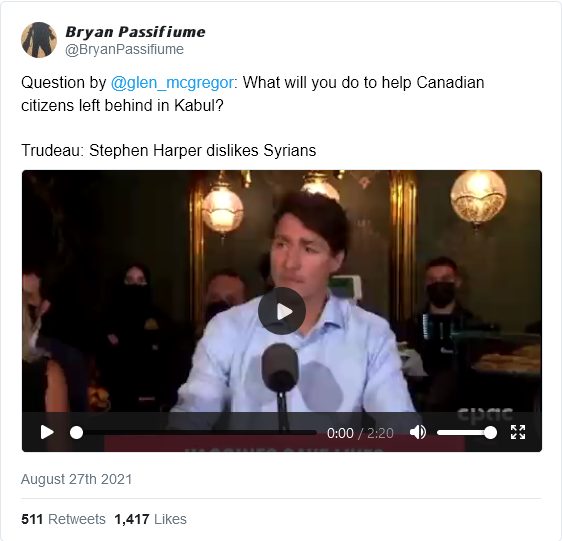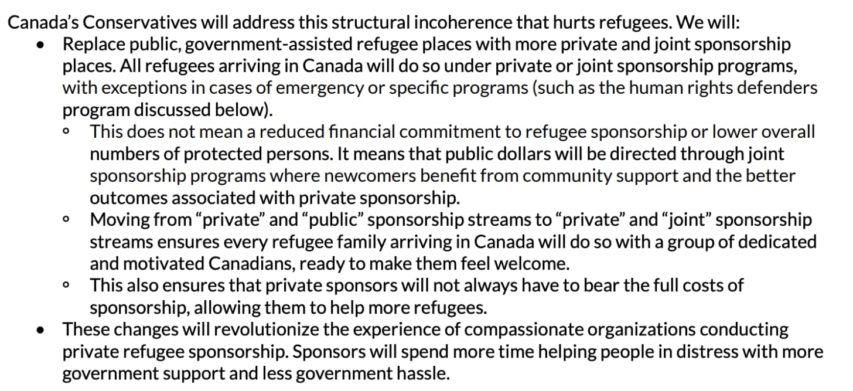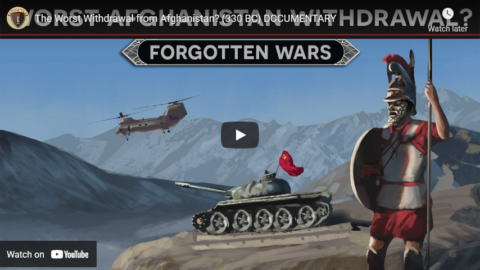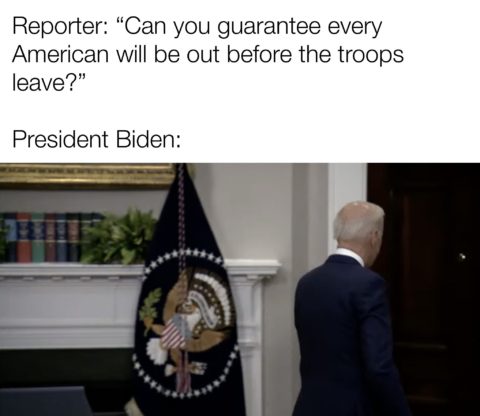Take the Afghanistan bugout. As Z Man pointed out in his column today, it was gonna happen. And it was going to be a cock up; that’s just the nature of these things. A halfway competent Apparat would’ve let Bad Orange Man own it. They could’ve milked it for years. Hell, decades — it was 2012 before we were finally allowed to stop talking about who did or didn’t do what in Vietnam.
But the Apparat didn’t do that, and the reason was: Twitter.
All the Blue Checkmarks on Twatter agreed that “letting” Bad Orange Man pull out of Afghanistan would be “handing him a win”. After all, he said he was going to do it! And if he somehow got out before the 20th anniversary, that’d be an even bigger win. Obviously, then, they had to “let” Biden do it, because that’s a “win”. And of course he had to do it in August, so that he could “spike the football” on 9/11/2021.
So the withdrawal had to be pushed into 2021, and it had to be slapdash. Indeed, it had to be the exact opposite of whatever Bad Orange Man was planning to do, so that there was no possible way Bad Orange Man could claim a “win”. It had to be all Biden …
… and so it was. With results that anyone smarter than a concussed goldfish — which of course excludes everyone with a Blue Checkmark — could’ve predicted.
If the Blue Checkmark Borg on Twatter, then, decides that Brandon needs to look tough by nuking Moscow, then it’s go time. And since the social dynamic on Twitter is ever-spiraling lunacy — the only way to “win” Twitter is by being more screechingly insane about everything than everyone else — then whoever gets there fustest with the mostest is going to drive the “decision”.
Severian, “Ukraine”, Founding Questions, 2022-02-24.
May 29, 2022
April 27, 2022
“We’re healthy from the bottom up, and sick from the top down.”
Chris Bray has a bit of fun at David French’s expense:
In the 1830s, British merchants with trade routes from India had forced open an enormous market for opium in China, and were pouring the product into the country, producing a lucrative addiction crisis. (Queen Victoria, the first Sackler.) But the Qing Dynasty had run China with a firm hand since the first half of the 17th century, and the emperors of the dynasty had long regarded themselves as, to use an academic term from the field of political science, The Shit. In 1839, Commissioner Lin Zexu sent a huffy letter to the British monarch, warning her that her tedious little pissant country over there in Nowhereville was trifling with a vast and dangerous power:
Our celestial empire rules over ten thousand kingdoms! Most surely do we possess a measure of godlike majesty which ye cannot fathom! Still we cannot bear to slay or exterminate without previous warning …
The British responded with naval artillery, and the limits of the Qing Dynasty’s power were revealed with the greatest possible clarity. Commissioner Lin had an image of himself, an understanding of his place in the world and the meaning of his nation’s power, that couldn’t survive an encounter with reality.
So: David French. In his own version of Commissioner Lin’s letter, French warns this week that American institutions most surely do possess a measure of godlike majesty which ye cannot fathom, yet ye weak and depraved subjects of these potent institutions offer not thine gratitude. It’s insane. He doesn’t see the world he’s describing, so his description doesn’t have anything to do with the people he’s talking to, and he has no idea.
Before I say anything else, though, I have to point out that I recently described the American crisis like this: “We’re healthy from the bottom up, and sick from the top down.” French does the opposite, describing institutions that are undermined by the dreadful human material beneath them: “Our government is imperfect, but if this republic fractures, its people will be to blame.” Wreckers and saboteurs have undermined the otherwise successful five year plan, you see. The problem is bottom-up.
This is exactly the same beat patrolled by “real conservatives” like Max Boot and Tom Nichols, who endlessly warn that the fat dumb peasants lack the sense to lick the hands of their capable superiors. These are very strange men.
Here, watch French do his thing:
The people disproportionately driving polarization in the United States are not oppressed minorities, but rather some of the most powerful, most privileged, wealthiest people who’ve ever lived. They enjoy more freedom and opportunity than virtually any prior generation of humans, all while living under the protective umbrella of the most powerful military in the history of the planet.
It’s simply an astonishing level of discontent in the midst of astonishing wealth and power.
Tell me the comparison to Commissioner Lin isn’t perfect. Does not our wealth and power astonish you!?!?
As French writes about the privileged creatures who live “under the protective umbrella of the most powerful military in the history of the planet,” the Taliban rules Afghanistan. A reminder: The Taliban controlled about half of that country in September of 2001; then the most powerful military in the history of the planet invaded, and fought the Taliban for two full decades, at the cost of thousands of lives and trillions of dollars, the result of which is that the Taliban now controls … all of the country. The implosion of the American effort in Afghanistan happened last fucking year, and we’ve somehow already taken care to forget the details of that goat rodeo. What was the plan?
April 2, 2022
Afghan Traditional Jezail
Forgotten Weapons
Published 1 Feb 2017The Jezail is the traditional rifle of the Afghan tribal fighter, although it originated in Persia (Iran). Distinctive primarily for its uniquely curved style of buttstock, these rifles still maintain a symbolic importance although they are utterly obsolete.
Every jezail is a unique handmade weapon, but they all share some basic traits. They are typically built around complete lock assemblies, from captured guns or bought/traded parts. The barrel is typically quite long and rifled, and the caliber is generally .50 to .75 inch. Unlike the domestic American flintlock long rifles, the jezail is meant for war and not hunting.
http://www.patreon.com/ForgottenWeapons
Cool Forgotten Weapons merch! http://shop.bbtv.com/collections/forg…
If you enjoy Forgotten Weapons, check out its sister channel, InRangeTV! http://www.youtube.com/InRangeTVShow
March 17, 2022
The “Three-Block”, “Four-Block”, or “n-Block” war
In The Line, Andrew Potter explains the genesis of the original “Three-Block War” idea and how a Canadian general tried to put theory into practice:
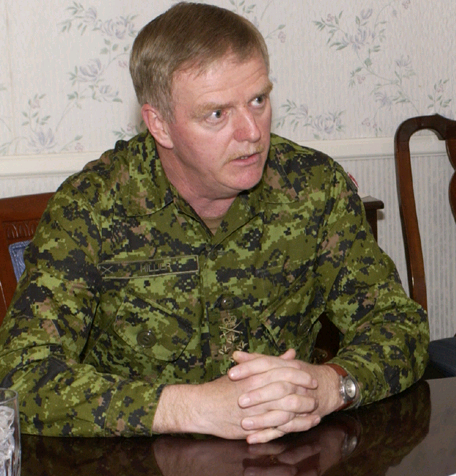
During General Rick Hillier’s first visit to Colorado Springs as Chief of Defence Staff, he takes a few minutes to talk with Tech. Sgt. Devin Fisher of NORAD and USNORTHCOM Public Affairs about Canada-U.S. Relations
Public domain image via Wikimedia Commons.
In 1999, a US Marine general named Charles Krulak wrote a piece in which he claimed that the future of combat for the Marines would be in urban environments in failed or failing states. In these situations, front line infantry might be doing humanitarian relief in one part of the city, performing peacekeeping duties in another, while doing intense urban combat in a third. He called this the “Three Block War“. Figuring out how to prepare and train for this scenario would be the central military challenge of the 21st century.
While the Three Block War was picked up and booted around as an interesting idea, it was never formalized into Marine doctrine. But one person who did take it seriously was Rick Hillier, the former head of the Canadian military who brought it into the Canadian forces when he took over as chief of the land staff in 2003, arguing that the Three Block War in failed and failing states was the future of warfare. He wanted a CAF that was trained and kitted out for this reality. When he became Chief of the Defence Staff in 2005, Hillier kept pushing this idea on Paul Martin and the Liberals, who loved his “vision” and firm sense of priority-setting.
In Hillier’s hands, the Three Block War concept was a disaster. Some American analysts blamed the strategy for Canada’s elevated casualty rates in Kandahar. The concept also came under considerable scrutiny from Canadian military analysts. In a highly critical paper, Walter Dorn and Michael Varey described the three block war idea as “fatally flawed“. While the Three Block War concept might have served as a useful description of a certain type of tactical reality (amplified maybe by a few too many viewings of Black Hawk Down), as a strategic concept it had a number of problems. For example, it wasn’t clear how it would apply to other armed services, or to theatres other than urban centres. It seemed to threaten the specificity of mandate and mission that is crucial to military operations. It clearly ran the risk of “block inflation” — why not throw governance, economic development, general nation building, and anything else you think you can get the military to do into the hopper? Indeed, in 2005 General James Mathis co-authored a piece proposing the concept of the four block war, which added psychological and information operations to the mix.
Ultimately, Dorn and Varey were concerned that crucial distinctions central to warfare were being elided. As they put it, the whole point of doctrine is to make a clear delineation between things that are “war” and things that are “not war”, and the Three Block War threatens to make everything into a type of war.
Two decades later the verdict is in, and it looks like everyone was right. When it comes to the tactical environment, people like Krulak, Hillier, and Mathis were more prescient than they might ever have imagined, at least if Ukraine is any template for how modern warfare is evolving. Yet at the same time, everything the critics of the Three Block War concept worried about has also come to pass: the confusion of mission and mandates, the endless proliferation of “blocks”, and most seriously, the assimilation of everything, and everyone, into “war”.
In his original article, Krulak argued that the reality of the Three Block War meant that any local engagement or interaction could have repercussions on the mission as a whole. For example, if a squad of Marines based in a “peacekeeping” block of the city gets jumpy and opens fire on a civilian truck carrying humanitarian aid (and not a truck bomb), that could have serious impacts for the entire strategic effort. And so he coined the notion of the “strategic corporal”, a front line soldier who would have the training, judgement, and moral fibre to do his or her job in a way that would always support strategic objectives.
February 16, 2022
QotD: The fall of Kabul was “a margin call”
The fall of Kabul will make the United States less willing to use military power to achieve national goals and, at the same time, make the use of decisive and overwhelming military force more necessary when the U.S. does decide to act. For years, America used her military scorecard in World War II as “credit” with our allies and adversaries. The positioning of a small American military force in some corner of the world provided deterrence at a fraction of the cost of placing a large enough force to actually win a decisive engagement or a campaign. We can all think of innumerable examples where America “held the fort” in a variety of strategically valuable locales while in reality planning to fight no more than two — I mean one and a half or maybe even just one — actual conflicts at any given time. America was and is securing key terrain “on margin”.
Kabul was a margin call. From now on, America may well be obliged to “pay cash”, viz., deploy combat capable formations of sufficient size to engage and win if we want anyone to take us seriously. A token “speedbump” force or a promise of “over the horizon” support — which is the majority of what the U.S. military now does — isn’t going to reassure any friends or deter any adversaries. At least not anyone who is paying attention.
Our adversaries will be emboldened. It is not so much that America’s military reputation has been irretrievably damaged, but the lessons that the Vietnamese, the Hmong, and now the Afghans have learned so painfully cannot fail to be appreciated by us or by the wider world. It appears that America (not the military, but America herself) has lost her stomach for a real fight. Americans taught the world the same lesson about the British Empire during the Revolutionary War (although Britain recovered enough to build her “second empire”), it would be foolish to fail to now see ourselves through that particular historical prism.
Garri Benjamin Hendell, “The Day After Kabul”, The Angry Staff Officer, 2021-11-02.
January 22, 2022
1842 Retreat From Kabul
The History Guy: History Deserves to Be Remembered
Published 22 Sep 2021On January 13, 1842, a single man on horseback approached the British garrison at Jalalabad, where soldiers were waiting for a retreating army of several thousand. Exhausted, the man had part of his skull shaved off by a sword and his horse was so exhausted that it would soon perish. As he was brought into the walls of the city the lone man was asked where the rest of the army was. “I am the army,” he replied. Thus ended a disastrous retreat from Kabul, where a British force of some 4,500 soldiers and thousands of civilians was almost entirely destroyed.
This is original content based on research by The History Guy. Images in the Public Domain are carefully selected and provide illustration. As very few images of the actual event are available in the Public Domain, images of similar objects and events are used for illustration.
You can purchase the bow tie worn in this episode at The Tie Bar:
https://www.thetiebar.com/?utm_campai…All events are portrayed in historical context and for educational purposes. No images or content are primarily intended to shock and disgust. Those who do not learn from history are doomed to repeat it. Non censuram.
Find The History Guy at:
Patreon: https://www.patreon.com/TheHistoryGuy
Please send suggestions for future episodes: Suggestions@TheHistoryGuy.netThe History Guy: History Deserves to Be Remembered is the place to find short snippets of forgotten history from five to fifteen minutes long. If you like history too, this is the channel for you.
Awesome The History Guy merchandise is available at:
https://teespring.com/stores/the-hist…Script by JCG
#history #thehistoryguy #Afghanistan
December 9, 2021
Tank Chat #135 | Marder | The Tank Museum
The Tank Museum
Published 27 Aug 2021In this latest episode of Tank Chats, Curator David Willey details the German Marder. A post-war Infantry Fighting vehicle.
Support the work of The Tank Museum on Patreon: ► https://www.patreon.com/tankmuseum
Visit The Tank Museum SHOP & become a Friend: ► tankmuseumshop.orgTwitter: ► https://twitter.com/TankMuseum
Instagram: ► https://www.instagram.com/tankmuseum/
#tankmuseum #tanks
September 30, 2021
“The nicer the Canadian, the worse the hypocrisy gets”
In The Line a Canadian veteran of Afghanistan (writing as “Tommy Conway”) explains why Canada’s “nice guy” illusions have made us weaker and unable to succeed at so many of our endeavours:
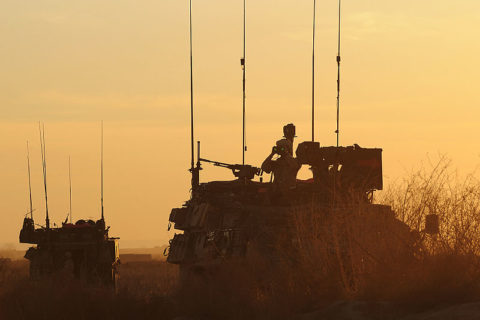
Canadian Army LAV III convoy near Khadan, Afghanistan, 2010-01-25.
Photo by Staff Sgt. Christine Jones via Wikimedia Commons.
We do not merely have an institutional problem, but a spiritual one. The peoples of the Western democracies have lost their sense of shame. Canadians, in particular, have lost our collective self-respect. We have become “nice guys”, the sort of people who expect to be praised because we can do no harm. We have ceased to be a citizenry that values honour — the kind of people who are capable of doing hard things, and willing to spend a lot of effort doing the right ones.
During the Afghan war, many NATO soldiers lived in very harsh conditions “outside the wire”. In forward patrol bases or on extended missions, water was at a premium, so washing socks was a weekly treat. But for others, Afghanistan meant a lot of time generating PowerPoint decks in bloated headquarters. Go past the walls in Kabul which separated the safe NATO bases from the bustling city, and one could find cafes staffed by friendly Nepalese baristas, air-conditioned gyms, and plentiful cold drinks.
Absurdly, in the American compound at the same Kabul International Airport where desperate evacuees tramped through trenches of human waste and barbed wire to escape the country as the Taliban advanced, the U.S. Air Force maintained a pleasant compound with green grass. Kandahar International Airport was well-known for a much-frequented strip of fast-food outlets, including a Tim Hortons.
These amenities warped the perspective of those with regular access to them. Canadian Army lore is full of tales of confrontations between bedraggled, unshaven troops coming in from patrol being denied access to an iced capp for improper dress. I’ve rarely been so embarrassed as the time I took tea from an Afghan father of three, smiling in the sweltering heat of an Afghan summer, only to return to my relatively comfortable quarters behind safe walls to hear people bitch and moan about the fridge being out of their favourite pop.
It wasn’t just individual troops who lost perspective. Senior leaders made a big deal about receiving two beers on Canada Day, and put extensive measures in place to conceal the festivities from Afghan staff because the presence of alcohol might offend cultural sensibilities. I am not a cultural expert, but I imagine the locals were offended about the well-watered, visibly overfed, air-conditioned people in less than a kilometer from the poverty of the population they were supposed to be protecting. Some of the old-timers, who had served with the Communist army, stated categorically that they liked the Russians more because they shared their vodka — and their hardships.
We barely had perspective then, and we sure as hell don’t now.
Predictably, the further from the theatre of operations, the more that perspective was distorted. Somehow, the Canadian public grew “war-weary” over Afghanistan, though it’s difficult to understand what tired them. Between 1939-45, this country sustained a full field army, despite drawing from a population a third of today’s size. Canadians withstood rationing as tens of thousands of their countrymen died overseas, and came out of the war optimistic about the future.
[…]
Compare that to what we suffered in Afghanistan; we sustained a strong battalion group, and maintained a few bloated headquarters — all of this proved to be too much to keep up. Canada slid into a training mission in 2011 and then gave up completely in 2014. During the fighting, the vast majority of the population felt no impact whatsoever. As Tom Nichols paraphrased a U.S. officer in Iraq, “We’re at war, America’s at the mall.” Canada was there with them, complaining about the lines in the food court.
September 6, 2021
Arms for the Taliban
Mark Steyn points out an absolutely unbelievable statistic about the military equipment windfall the US military presented to the Taliban in their rush for the exits out of Afghanistan (in bold, below):
Denyse O’Leary, whom I always read with great interest in our Comments section, chides me for diagnosing our present woes but not proposing solutions.
That ought to be easy. In Afghanistan what needed to be done is almost as old as man. As Victor David Hanson pointed out to Tucker, “This is the greatest loss of military equipment in the history of warfare by one power.”
He’s right. Because US government is so drunkenly profligate, the numbers sound blah-blah to jaded American ears. But $85-90 billion is larger than the annual military budget for every nation around the world except the US and China. For those partial to the International Jewish Conspiracy theory of history, what America has just given the Taliban is equivalent to 85 per cent of all the military aid Washington has given Israel since 1948. The Taliban now possess more Black Hawk helicopters than almost all America’s allies; they own near to a tenth of all Humvees on the planet. That’s aside from less obvious items, such as over 160,000 radios and over 16,000 night-vision goggles that will come in mighty handy for wiping out the remnants of resistance in the Panjshir Valley.
The “solution” to this is to do what every army has known to do down through the millennia: a retreat means not just preventing your men from falling into the hands of the enemy but also their weapons – including, if necessary, your allies’ weapons. As many readers will know, at the beginning of July 1940, just a week after France threw in the towel and signed its armistice with Germany, the Royal Navy attacked and disabled the French fleet, then the largest and most powerful in Continental Europe.
The British priority was to prevent the ships falling into the hands of Germany and Italy, who would put them to very good use. In a few days of urgent negotiation, the French commander resisted London’s “suggestion” that he either place the fleet under British command or take it to the French West Indies. So the Royal Navy struck and over 1,300 French sailors were killed.
But the Germans didn’t get hold of France’s most powerful battleships — and the following day, when the French ambassador complained about it to FDR during Washington’s Fourth of July observances, the President said he would have done exactly the same.
Yet Roosevelt’s successor did not do the same — in far more propitious circumstances and on a timeline created by the commander-in-chief and his advisors.Is the Pentagon total crap? Yes, but, like so many other rackets in Washington, it works for its principal beneficiaries: the defense contractors made over two trillion bucks off the Afghan war, so a mere eighty-five billions’ worth of materiel winding up with the goatherds is way below the lobbyists’ pay grade. The official position of America’s National Security Advisor, Jake Sullivan (a fetching twelve-year-old lad whose pressers give the vague feeling he’s auditioning for the Dancing Boys of Kandahar), has conceded:
We don’t have a complete picture, obviously, of where every article of defense materials has gone, but certainly a fair amount of it has fallen into the hands of the Taliban.
Functioning armies know how many pencils they have. As I said, I take it as read that Thoroughly Modern Milley and the Chiefs of Staff are total crap — all ribbons and no chest, the self-garlanded buffoons of a way of war that has not worked for decades: I see David Horowitz and Daniel Greenfield are calling for the Joint Chiefs to be court-martialed, which is the very least one would expect for gifting a Nato-level military to one’s enemies. But the fact that every commander on the ground went along without apparent objection suggests that Milley-style degeneracy runs very deep in the US military.
August 31, 2021
The Line‘s She-lection Bullshit Bulletin No. 2
Yes, it’s time to publish some of the silliest political bullshit our “leaders” and their parties are slinging around in the federal “she-lection”:
Let’s start with an interesting one.
We’d recommend watching the whole clip (and we’d also note that there’s a second video clip further down in the thread; technical limitations broke one long clip into two shorter ones). But there’s two piles of dung here, and it’s worth breaking them out separately.
The first is, of course, the patented non-answer to a direct question. Glen McGregor asked Trudeau about our people in Afghanistan who were in that very moment in immediate danger. Trudeau talked about something nice he did in 2015. We understand that this is a campaign, but imagine you or someone you love is stuck Afghanistan in now, and the leader of the country is asked about you/them, and that’s the answer? Really?
The second pile of scat is more nuanced. Check out the part of the clip starting at 1:25. Trudeau says that O’Toole and the Conservatives are “promising to end the very program that brought in tens of thousands of Syrian refugees, the very program we’re using to bring in tens of thousands of Afghans fleeing to [safety] in Canada. That doesn’t make sense.”
Well, we mean … it doesn’t make sense because it’s not true.
The Tories are proposing changes to how Canada accepts refugees. Specifically, they want to shift to more heavily rely on privately sponsored refugees, citing research that shows these refugees more easily and more quickly settle into Canada. There would be both government-sponsored and private-sponsored refugees under what the CPC is calling a “joint model” model. This is broken out in the CPC’s campaign platform on page 129.
This seems … pretty reasonable? The Tories are not only promising to maintain current funding levels and numbers of accepted refugees, they just want to structure it differently. Not even very differently, at that: of the 62,000 Syrian refugees that Canada has resettled since Trudeau came to office, half were privately sponsored. The CPC platform also very specifically notes that this wouldn’t apply in “cases of emergency”, which the fall of Afghanistan clearly is. You can criticize that as policy, or even doubt they’ll follow through. Just saying they’ll cancel the program, though, is nonsense.
Of course, Trudeau isn’t the only bullshitter on the campaign trail, so RTWT for the rest of the antics that The Line felt were bullshitty enough to register this week.
August 30, 2021
The Worst Withdrawal from Afghanistan? (330 BC)
Invicta
Published 28 Aug 2021Afghanistan has a long history of foreign invasions and withdrawals. Today we explore the first of these chapters with the campaigns of Alexander the Great. Signup for your FREE trial to Wondrium here: http://ow.ly/C3xs30rNLaU
As the last chapter of the US war in Afghanistan appears to draw to a close, the world watches armed and civilian forces alike conduct their final evacuations. However in these moments we hear echoes of the past. The history of the so-called “Graveyard of Empires” is filled with many chapters that tell of yet another major power that has been forced to withdraw after years of spilled blood and treasure. The most well-known instances have occurred in recent memory. However the pages of Afghan history go back thousands of years. Today I wanted to take a look at one of these first major military withdrawals that may just be the most FUBAR one on record; The evacuation of Alexander the Great’s Macedonian army from Afghanistan.
In order to contextualize this conflict we first begin with a quick overview of the history of Afghanistan. No country existed by that name or with those borders in antiquity and it was instead made up of a variety of tribal coalitions and minor kingdoms for much of its early history. However it would first see foreigners begin to claim its lands with the rise of the Median Empire and the succeeding Achaemenid Empire. The lands of modern Afghanistan would now be carved into a series of Satrapies such as Bactria, Gandara, Arakhosia, Drangaian, and Areia.
Following the Ionian Revolt and the Greco Persian Wars, the Kingdom of Macedon would rise to power and take on this ancestral conflict as a way to unify the Hellenic world behind its rule. Phillip II first began to plan and invasion of the Achaemenid Empire but it would be Alexander the Great who carried out this vision. He would campaign for several years through Anatolia, the Levant, Egypt, and Mesopotamia, consuming vast swaths of the enemy’s domains. However King Darius would escape to the east. Alexander initially pursued the Great King but when he was killed by his own Lieutenant, Bessus, Alexander set off against this traitor.
In this chase, Alexander the Great would be sucked into a multi-year war to subdue the eastern satrapies that made up modern Afghanistan. We cover the most significant events of this campaign, the establishment of occupying forces, and the eventual withdrawal of the army following the death of Alexander the Great. The ensuing settler revolt would make it (in my eyes) one of the most FUBAR Afghanistan withdrawals in history that would certainly be worthy of a Vice news documentary had it existed.
The Campaigns of Alexander the Great by Arrian
In the Footsteps of Alexander the Great by Michael Wood
Alexander the Great and Bactria: The Formation of a Greek Frontier in Central Asia by Frank Holt
The Greeks in Bactria and India by W. W. Tarn
On the revolt of the Greek settlers by DiodorusCredits:
Research: Invicta
Script: Invicta
Narration: Invicta
Artwork: Penta Limited#History
#Afghanistan
#Documentary
Mark Steyn on chocolate soldiers, tutti-frutti generals, and the ice-cream commander-in-chief
When all that matters is not performance but performance art:
On the day that twelve US Marines and some 150 civilians were blown apart by suicide bombers, it was heartening to learn what real heroism is.
Until January 6th, the highlight of Michael Byrd’s “law-enforcement” career was leaving his loaded Glock in a congressional men’s room and paying no price. He “serves” with the grotesquely misnamed “Capitol Police”, which is not a police department but a praetorian guard – a personal security team for the praetors of Congress. Lieutenant Byrd shot and killed Ashli Babbitt, a 5’2″ unarmed woman, because “she was posing a threat to the US House of Representatives”.
All that has been known for months by anyone who wanted to know. The only real news in NBC’s Byrd exclusive was the level of his self-congratulation:
I believe I showed the utmost courage on January 6.
His interviewer, Lester Holt, did not respond: “Er, hang on, isn’t that the kind of thing you’re meant to leave for someone else to say about you?”
And did he have to say “utmost”? Even in as unutterably vulgar an age as ours, is even Michael Byrd incapable of imagining any “courage” greater than his own?
Ah, well, don’t over-think it; it’s just one of those phrases, half-remembered by Byrd from some Rose Garden medal ceremony he caught on TV: “utmost” goes with “courage” like “white” goes with “supremacist” and “domestic” goes with “terrorist”.
America is a land that tends to the utmost in all things. At the end of the nineteenth century, Bernard Shaw popularized the term “chocolate soldier” — the dashing hussar who is useless in battle but looks good in a uniform. We have the tutti-frutti generals: Thoroughly Modern Milley and his chums, whose diversity ribbons from shoulder to scrotum advertise their own utmostness even as they explain why everything going wrong merely demonstrates how everything is going right.
The tutti-frutti generals report to the ice-cream commander-in-chief melting all over the lectern every afternoon. His predecessor was on telly all day every day; Mr Biden was sold to head-in-the-sand Americans as the quiet-life guy who wouldn’t be in your face. Unfortunately, when your countrymen get blown up by government blunders, the citizenry expects him to be in their faces at least every now and then. Across the Atlantic, Boris and the EU chaps were on the screen responding to an all too predictable atrocity. But in the White House Joe Biden’s meds hadn’t yet kicked in — or, conversely, they’d shot him the juice too early and it had worn off. So, as has become familiar, the melting waffle cone was hours late in tottering across the room, squinting into the camera and reading with woozy and wooden defiance. This time he gave it the full Corn Pop:
To those who carried out this attack, as well as anyone who wishes America harm, know this: We will not forgive. We will not forget.
But Joe, a man who cannot reliably name his own Defense Secretary, has already forgotten.
August 29, 2021
Justin Trudeau discovers for himself the truth of Harold Macmillan’s dictum on the most difficult thing about being Prime Minister
Former British Prime Minister Harold Macmillan was asked what was the most difficult thing about his job and is reported to have said, “Events, my dear boy, events.” Justin Trudeau had everything he wanted in the Canadian political situation in early August so he put his early election plans into action … and along came those unpredictable events:

“2019 Canadian federal election – VOTE” by Indrid__Cold is licensed under CC BY-SA 2.0
What would have happened in the election of 2021 if Afghanistan hadn’t fallen? If the writ had been drawn up just a few weeks before, or a few weeks after August 15, the day Kabul fell to the Taliban?
This is the sort of question political science nerds will debate over weak beer for decades to come. It’s no great mystery why the Liberals went forward with the election even as armed fighters began to stream into the capital city of a country in which Canadians have sacrificed so much time, blood and treasure.
But I can picture the scene in the war room now and the logic is inescapable. The meeting with the governor general had been set, the news leaked, the campaign messaging laid out, the suits pressed and the planes booked. Besides, as we all know: “nobody cares about foreign affairs.” That old cant, repeated, like a charm.
Most of the time, it’s true.
Canadians hadn’t thought about Afghanistan for a decade. We’d all stopped paying any mind to some poor nation on the dark side of the world, that disputed chunk of mountain and desert besieged by misery and war since the time of Alexander the Great.
Nobody cares about such things. Until they do.
And what’s the difference between a foreign affair that we care about, and one that we do not? The answer is not flattering. We are selfish and solipsistic creatures. We care about current events abroad when what’s happening has some connection to ourselves or our interests — or when the news reflects something about ourselves.
I would not be the first pundit to point out the parallel between the fall of Kabul and the death of Alan Kurdi, the three-year old Syrian refugee boy whose body washed ashore after drowning in the Mediterranean Sea in September of 2015, in the midst of the federal election that brought Justin Trudeau to power. That child’s doll-like body, face-down on a beach, destroyed us, and the tragedy was made more pointed with the discovery that his family had been trying to reach Canada. And that his asylum application had been rejected by officials in Stephen Harper’s government.
In our own bureaucratic nightmare, and Harper’s dispassionate response, we saw reflected our own lack of compassion.
What we are confronting now in Kabul is our lack of competence.
August 28, 2021
The name “Afghanistan” is becoming a badge of shame for western politicians, and deservedly so
In The Line, Matt Gurney points out that while it was probably beyond the capabilities of the Canadian government to evacuate all Afghanis who had assisted Canadian efforts in that country, the actual efforts fell very far short of even “adequate”:

On the second day of the Taliban’s rule in Kabul, the front of Hamid Karzai International Airport was crowded with people trying to travel abroad, but were stopped by Taliban militants, 17 August, 2021.
Public domain image from VOA via Wikimedia Commons.
We have to cut through the fanatics on both sides and be very clear about this: the evacuation was always going to be messy. We were never going to get everyone out. But it is obvious that we did not get out as many people as we should have. It’s clear that we made major errors, including failing to work with veterans and aid groups on the ground; we did not lift bureaucratic hurdles quickly enough. We lost time dithering. That is our shameful failure.
It is not the Canadian government’s fault that our American allies decided to pull out of the conflict. Frankly, I still can’t entirely blame either the Trump or Biden administrations for that decision, although the execution of that decision has been catastrophic.
This was not a decision made in Ottawa, but in Washington, and for entirely American reasons. Further, the Liberals are not to blame for the U.S. government’s massive intelligence failure. We were caught totally flatfooted by the rapid and total collapse of the former Afghan government — what had been expected to take months took days. Canada, a member of both NATO and the Five Eyes, relies heavily on the intelligence gathered by our larger, more powerful ally. I do not fault Liberal party leader Justin Trudeau or his government for being caught unprepared.
So let’s dispense with that nonsense right away. In the big picture, there is not a whole hell of a lot Canadian governments could have done to avoid this crisis.
But we could’ve managed the crisis much better.
Over the last 10 days, we’ve had repeated reports of bottlenecks caused by over-restrictive paperwork requirements. We’ve seen other allies flying helicopters into Kabul to allow them to retrieve their people from sites around the city; Canada has helicopters and the ability to deploy them, but we didn’t follow suit.
Reports indicate that there was a gap of several days in any meaningful Canadian Armed Forces presence on the ground — and that gap set us back in terms of intelligence and planning. Canadian officials reportedly worried about the number of seatbelts on our transport planes even as other allies were loading their aircraft up with as many people as they could (we eventually began cramming evacuees into ours, as well). In several recent pieces here at The Line, Kevin Newman has described the struggle faced by those those trying to escape — people to whom we had had promised safe haven as their lives were now in peril due time they spent helping us during our missions in Afghanistan. There are numerous reports of our government telling these people to show up at gas stations and hotels — only to ghost them.
Facts beyond our control limited how effective we were ever going to be at getting people out, but we did not max out our effectiveness within those constraints. As a result, people will die who did not have to. The gap between the best-possible Canadian response and the actual Canadian response is a gap measured in lives.
I’m always happy to point the finger at Prime Minister Trudeau for his mistakes, but as Matt Gurney writes above, there was little that Trudeau could have done to avert the humanitarian disaster still unfolding around Kabul. The blame for deciding to pull out without adequate (or any) notice to allies or competent logistical and administrative planning lies with Joe Biden, as Conrad Black explains [this was written before the bomb attacks outside the airport in Kabul]:
Biden, in his address last Monday, in his midweek interview with George Stephanopoulos, and in his address on Friday, uttered a series of egregious falsehoods that were quickly exposed. He said there was no expression of discontent from America’s allies. For the first time in history, references to an American president in the British Parliament were met with shouts of “shame”. When Thomas Tugendhat, the chairman of the House of Commons Foreign Relations Committee and a retired colonel who served with distinction in Afghanistan and was decorated by the U.S. 82nd Airborne Division for combat bravery, said that it was shameful for a commander-in-chief who has not served under his own colors to mock the sacrifice of men who have, all parties in the British House agreed. No American president has been so severely or — unfortunately — deservedly insulted.
No American, consuming only mainstream media narratives, would realize that there were three times as many allied forces from assorted NATO countries in Afghanistan as there were Americans, or that they were not consulted before the Americans abruptly departed and brought the roof down on all of them. The Western alliance, as former President Trump emphasized, has its problems. Most of the members were not pulling their weight. Germany, the strongest NATO country after the United States, has almost disarmed and has effectively made itself a Russian energy satellite through the Nord Stream 2 natural gas pipeline. But they did not deserve this.
After this horrifying fiasco, where the Americans scuttled and turned tail and left their European allies and Canada to fend for themselves, the NATO members have already indicated that they are in no mood to follow this administration anywhere. No one can blame them. Biden said on Friday that the United States was not sending armored vehicles to collect its citizens and bring them to Kabul airport as the British and French were doing because, he explained, Americans were not being stopped by Taliban checkpoints. Half an hour later, the inarticulate Pentagon spokesman John Kirby squarely contradicted his commander-in-chief, and the official explanation was changed to advise Americans not to try to reach the airport because of the danger.
Biden said the Afghans wouldn’t fight so they weren’t worth the risk of American lives; but 50,000 Afghan soldiers and scores of thousands of civilians have died in this war. No Americans ha[d] died in Afghanistan in 18 months (in stark contrast to the soaring crime rates in almost all American cities). As Tugendhat told the House of Commons, it is not for the commander-in-chief of this cowardly, shameful, and disastrous flight from American national responsibilities, who has never served in his own armed forces, to disparage those who have died in allied forces for a cause that he has abandoned and doomed.
The one potentially positive aspect of this horrible debacle has been the unarguable revelation that the president is not up to his job.
August 23, 2021
Canada is extremely good at posturing on the international stage … not so good at performing
Kevin Newman on the continuing failure of the Canadian government and Canadian Armed Forces to protect and retrieve the people in Afghanistan we’ve promised to help:

On the second day of the Taliban’s rule in Kabul, the front of Hamid Karzai International Airport was crowded with people trying to travel abroad, but were stopped by Taliban militants, 17 August, 2021.
Public domain image from VOA via Wikimedia Commons.
It is impossible to piece together, or understand, why no one from Canada would come out of the military protection of the airport to speak to them over the past two days. Because there must have been a whole lot of talking happening on the safe side of the razor wire barrier separating the Afghans from the terminal. Late Friday, a Canadian C-17 carrying more soldiers and a few diplomatic and immigration staff arrived at Kabul’s military air terminal. They had a plan to work with American forces to get some of the gas station people out of the country. There seemed to be renewed confidence expressed in media interviews by Immigration Minister Marco Mendicino that, finally, things would happen.
Instead the Americans started executing rapid-retrieval missions into Kabul to get their own people out, sealed the entrance where Canada’s gas station people were waiting, and co-operation with Canadian forces seemed to disintegrate.
In the meantime, there was a game of numbers to play. With so few Canadian cases on that C-17 ready to return to a third country, the big grey plane was loaded with Afghans that other countries had successfully brought to the airport. A picture and story was fed to political reporters on the campaign trails in Canada declaring broadly that “106 Afghans have been flown out on a Canadian C17” – but National Defence would not reveal if any of those passengers had been Canadian cases.
According to the Globe and Mail‘s Stephen Chase there had been none on the only other Canadian flight of 175 to leave the airport twenty-four hours earlier, even as the government boated of another “success”. For weeks, the Prime Minister and his besieged cabinet had also been talking about 20,000 refugees coming to Canada. That too was misleading in is vagueness, according to Global News’ Mercedes Stephenson, as all but a handful are coming from outside Afghanistan and even then, it’s over many years.
There is zero evidence from multiple Afghan sources around the airport that any of those the Prime Minister boasts they’re “rescuing”, (LGTBQ2, human rights advocates, women and journalists) have come from Kabul or any part of Afghanistan in the past month.
With all that, the government continues to claim a C-17 will come and go each day. But do the math. If even a hundred daily Canadian cases make those flights, (no where near that many have so far), there is no way the vast majority of applicants will make it here before the window closes for evacuations. Canada’s commitment of men and materials in no way matches the need. So, will Immigration officials those with no hope now of rescue and admit that they won’t get out in time? That number is likely in the thousands. They need to develop a more realistic way to survive the Taliban.
The mystery in this deadly absurdity is the government’s obsession with paperwork. Even today Canadian officials on the safe side of the airport controlling who might get through were reported by eyewitnesses to be taking an “extremely strict” approach to paperwork verification. Only those granted full Canadian citizenship under the government’s Special Immigration Measure are being told they qualify to leave. That requires a lot more work to process and is perhaps less than a tenth of all the Afghans who are known to have applied and are in various stages of completing multiple forms.
Other countries have also been willing to grant refugee status to their interpreters and families, which doesn’t guarantee citizenship, but is it is a much faster way to process many more people, and it gives Afghans more choices should air rescue be impossible. In a news conference, Mendicino claimed his department’s agent in Kabul has authority to overlook the passport and biometric fingerprint requirements. But the evidence on the ground suggests he is being ignored.

